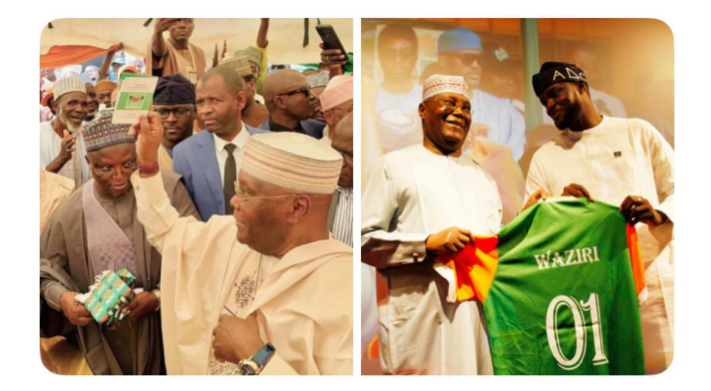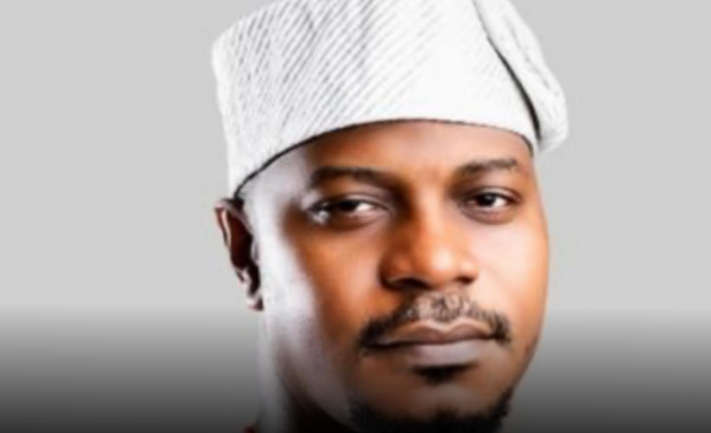
Atiku Abubakar’s Bold Political Gamble: Former Vice President Makes Shock Move to ADC in Adamawa

Nigeria’s political landscape was shaken today as former Vice President Atiku Abubakar officially joined the African Democratic Congress (ADC) in Adamawa State, marking one of the most dramatic political shifts in recent years. The announcement, which spread rapidly across political circles and social media, has already stirred nationwide conversations about what this means for the future of the opposition, the ruling party, and the 2027 general elections. For a figure whose name has become synonymous with presidential ambition, Atiku’s move signals not just a fresh chapter, but a calculated gamble that could redefine Nigeria’s political terrain.
The declaration was made in Yola earlier today, where Atiku was warmly received by top ADC officials, state executives, local stakeholders, and an enthusiastic crowd of supporters who had gathered in anticipation of the long-rumored switch. For weeks, speculation had grown about Atiku’s dissatisfaction with internal dynamics in the Peoples Democratic Party (PDP), which he has represented in multiple presidential contests. But few expected him to take the bold step of joining a smaller party at such a critical moment. Yet, as one political observer noted, “When Atiku makes a move, it is never random. It is always part of a bigger plan.”
Sources close to the Adamawa political structure say preparations had been underway quietly for several days, with ADC leaders finalizing arrangements to welcome the former presidential candidate into their fold. The moment he stepped into the venue today, the atmosphere surged with excitement. Supporters waved ADC flags, drums and cultural troupes filled the air with celebration, and chants of “New Beginning! New Hope!” echoed throughout the arena. Atiku, visibly energized, took his time greeting local leaders before taking the stage to speak.
In his short but firm speech, he emphasized that Nigeria cannot afford to repeat the same political patterns and expect different outcomes. Although he avoided explicitly attacking his former party, he hinted at deep frustrations that had built over time. “Nigeria stands at a crossroads,” he said. “And to move forward, we must embrace platforms that prioritize unity, innovation, and people-driven leadership. This is why I am here today. This is why I am joining the ADC.” His words were met with roaring applause.
The significance of Atiku’s defection cannot be overstated. For decades, he has been a heavyweight within the PDP, wielding influence, mobilizing nationwide support, and emerging as the party’s standard bearer in multiple presidential elections. His exit leaves a vacuum that the PDP may struggle to fill, especially in the northern region where he remains a towering figure. Political analysts have already begun questioning how the PDP will regroup, who will lead the next presidential ticket, and whether the party can withstand the shockwave of losing one of its biggest assets.
Meanwhile, for the ADC—often perceived as a fringe party struggling to assert itself nationally—this is a monumental win. Atiku’s entry instantly changes the party’s profile, boosting its credibility and transforming its strategic value ahead of future elections. Until now, the ADC has been known mostly for regional influence and occasional strong showings at state-level contests. But with Atiku now onboard, the party is positioned to attract new alliances, gain broader recognition, and potentially reconfigure the power balance in several states.
Across Adamawa, reactions were swift and passionate. Supporters flooded the streets of Yola, many expressing excitement that their son has once again taken center stage in national politics. Local youth groups held impromptu rallies, praising the move as a courageous step toward rebuilding Nigeria’s political structure from the ground up. For many in Atiku’s home state, the decision reaffirmed their belief that he remains committed to Nigeria’s democratic progress. “It takes a strong man to leave comfort for conviction,” said one supporter, waving an ADC scarf.
However, not everyone is celebrating. Within the PDP, shock and concern dominated early reactions. Though party leaders have yet to release an official statement, insiders hint that emergency meetings are already underway to assess the impact and chart a response. Some party faithful expressed disappointment, arguing that Atiku should have remained to help rebuild the party rather than defecting at a time of internal turbulence. Others fear that his exit may trigger further defections, especially among politicians who have long aligned themselves with his political machinery.
Political analysts across Nigeria also weighed in, viewing the move through different lenses. Some argue that Atiku has nothing left to prove within the PDP and that joining the ADC could offer him a cleaner platform to pursue reforms and rally public support without entrenched internal resistance. Others see it as a risky strategy, noting that smaller parties have historically struggled to compete against Nigeria’s two dominant political forces. Nevertheless, most agree on one thing: Atiku’s decision will force political re-evaluations nationwide.
Social media, as expected, erupted immediately. Thousands of Nigerians shared reactions, with opinions split between praise, skepticism, amusement, and strategic theorizing. Memes, chants, political analyses, and heated debates flooded timelines within minutes of the announcement. Some users joked that Atiku has now completed a “political tour” of Nigeria’s parties, while others insisted that this time, his move feels different—more deliberate, more strategic, and possibly more impactful.
What remains certain is that this development will spark ripple effects far beyond Adamawa. For the ruling party, Atiku’s alliance with ADC introduces a new variable in an already complex political climate. The consolidation of opposition forces may become harder to predict, especially if other prominent figures begin exploring unconventional alliances. Meanwhile, undecided voters and independent groups may find renewed interest in alternative political structures if they see fresh momentum in the ADC’s ranks.
As the day unfolded, more details emerged about the negotiations that preceded Atiku’s switch. Though neither side has confirmed the specifics, insiders claim that the ADC leadership offered him not just membership but a significant role in reorganizing the party’s national structure ahead of 2027. Some speculate that he may be preparing to lead a broad coalition that transcends traditional party boundaries—a strategy that could redefine Nigeria’s political narrative.
Atiku Abubakar, at 78, has once again demonstrated his ability to surprise, evolve, and dominate public discourse. His political career, spanning decades of influence, controversy, ambition, and perseverance, has now entered a new chapter—one filled with uncertainty but also with immense possibility. As dusk settled over Yola today, supporters continued their celebrations long after he left the venue, chanting his name and the party’s new anthem. For them, this is more than just a political move; it is a symbol of renewal.
Whether his switch to the ADC will reshape Nigeria’s political destiny or end up as another experiment in the nation’s complex political theater remains to be seen. But for now, one thing is clear: Atiku Abubakar has once again shifted the spotlight, capturing national attention and igniting discussions that will continue for days, weeks, and perhaps years to come. In the ever-evolving chessboard of Nigerian politics, today’s move stands out as one of the most daring plays yet.


